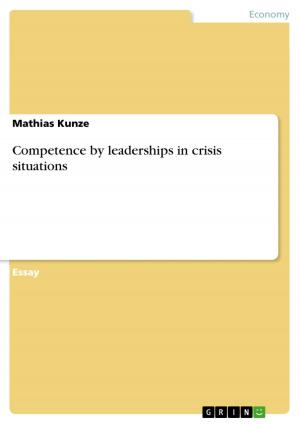The Role of the Perpetrators during the Holocaust in Martin Amis's Time's Arrow and the Moral Involvement of Future Generations
Fiction & Literature, Literary Theory & Criticism, British| Author: | Anonymous | ISBN: | 9783640576913 |
| Publisher: | GRIN Publishing | Publication: | March 26, 2010 |
| Imprint: | GRIN Publishing | Language: | English |
| Author: | Anonymous |
| ISBN: | 9783640576913 |
| Publisher: | GRIN Publishing |
| Publication: | March 26, 2010 |
| Imprint: | GRIN Publishing |
| Language: | English |
Seminar paper from the year 2009 in the subject English - Literature, Works, grade: 1, University of Münster, language: English, abstract: 'A literary text not only exploits and reallocates cultural discourses and meanings, it also may have such an influence on them that it becomes a medium of cultural memory, contributing to the formation as well as the perpetuation of cultural identity.' The present research paper raises the question how Martin Amis's Time's Arrow contributes to such cultural discourses and meanings (regarding content). The novel will be analyzed in terms of how it portrays the perpetrators of the Holocaust and which conclusions can be drawn from this specific point of view. The significance of the Holocaust for future generations will also be outlined. The style as well as the content of the novel will be taken into account to analyze how morality is portrayed (2.1. Morality and the 'Third Reich') and what consequences arise from this (2.2. Consequences of 'Third Reich' Morality). In this respect, the role of the reader in relation to the text will be elucidated (2.3. Moral Involvement of the Reader). The method of analyzing content and style of the novel seems crucial to provide an answer to the raised question: 'Personally, I've always believed in the indivisibility of form and content. [...] Style is not neutral; it gives moral directions.' 'Style isn't something added on; it's intrinsic to the perceptions and the way you see life.' Postmodern theories of history point out that historical objectivity can not be accomplished: '[...] historians inescapably interpret, and thus shape, the history they want to document.' Particularly, Hayden White stresses the 'construct character' of historical conclusions. '[T]here is an inexpugnable relativity in every representation of historical phenomena.' Furthermore, in terms of dealing with and interpreting the Holocaust, one has to be aware of the circumstance that 'the historical narrativization of the Holocaust raises not only aesthetic problems, but also moral issues' . Hence, portraying the Holocaust has untold faces. Apart from the difference between interpretations, the motivation to provide an interpretation differs. (For instance, the purpose of memory might be used to legitimate the existence and form of a state. ) The description of the Holocaust is part of a 'cultural memory'. (The term is used here to 'describe the complex ways of which societies remember their past using a variety of media.' )
Seminar paper from the year 2009 in the subject English - Literature, Works, grade: 1, University of Münster, language: English, abstract: 'A literary text not only exploits and reallocates cultural discourses and meanings, it also may have such an influence on them that it becomes a medium of cultural memory, contributing to the formation as well as the perpetuation of cultural identity.' The present research paper raises the question how Martin Amis's Time's Arrow contributes to such cultural discourses and meanings (regarding content). The novel will be analyzed in terms of how it portrays the perpetrators of the Holocaust and which conclusions can be drawn from this specific point of view. The significance of the Holocaust for future generations will also be outlined. The style as well as the content of the novel will be taken into account to analyze how morality is portrayed (2.1. Morality and the 'Third Reich') and what consequences arise from this (2.2. Consequences of 'Third Reich' Morality). In this respect, the role of the reader in relation to the text will be elucidated (2.3. Moral Involvement of the Reader). The method of analyzing content and style of the novel seems crucial to provide an answer to the raised question: 'Personally, I've always believed in the indivisibility of form and content. [...] Style is not neutral; it gives moral directions.' 'Style isn't something added on; it's intrinsic to the perceptions and the way you see life.' Postmodern theories of history point out that historical objectivity can not be accomplished: '[...] historians inescapably interpret, and thus shape, the history they want to document.' Particularly, Hayden White stresses the 'construct character' of historical conclusions. '[T]here is an inexpugnable relativity in every representation of historical phenomena.' Furthermore, in terms of dealing with and interpreting the Holocaust, one has to be aware of the circumstance that 'the historical narrativization of the Holocaust raises not only aesthetic problems, but also moral issues' . Hence, portraying the Holocaust has untold faces. Apart from the difference between interpretations, the motivation to provide an interpretation differs. (For instance, the purpose of memory might be used to legitimate the existence and form of a state. ) The description of the Holocaust is part of a 'cultural memory'. (The term is used here to 'describe the complex ways of which societies remember their past using a variety of media.' )















